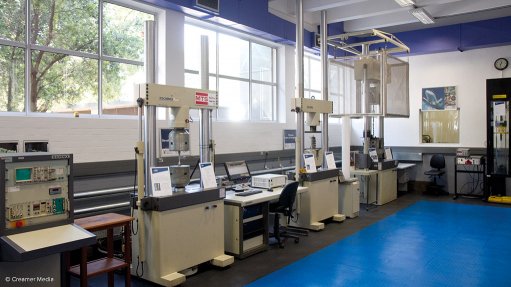
LAB INSPECTION
A-Gas tests and inspects refrigerants to ensure that they are legitimate and meet global specifications prior to shipment to South Africa
Photo by: Duane Daws
Illegal inferior refrigerants imports will increase as the ongoing phasing out of hydrochlorofluorocarbon and the impending phase out of hydrofluorocarbon (HFC) gases progresses, argues speciality chemicals and gas supplier A-Gas South Africa national sales manager Michael Labacher.
“These inferior refrigerants do not meet AHRI 700 specifications and, if they are used in a refrigeration system, the system will not work to the required efficiency, it might be running at a higher energy consumption or the inferior product could affect the system’s cooling capacity.”
AHRI 700 specifications indicate the acceptable levels of contaminants in refrigerants.
Labacher stresses that industry should be wary about new alternatives to HFCs. “Inferior refrigerants come and go, but we tend to see an increase in illegal imports when the prices of refrigerants go up locally.” This was the case when chlorofluorocarbon (CFC) gases were phased out in the 1990s.
A-Gas tries to mitigate these issues by inspecting stock at the source – which is mainly South-East Asia, where A-Gas also has branches – and testing the product before it is dispatched, as well as inspecting it again when it arrives in South Africa. A-Gas South Africa tests all products in its laboratories before it is down-packed into cylinders and drums. Clients are supplied with certificates of analysis and safety data sheets.
Gas-Trak Online
In February 2017, A-Gas launched a new service in South Africa, Gas-Trak Online, free of charge. It is a software program that enables contractors and wholesalers to track their sales purchases and sales installations, which would, in turn, enable them to track how much refrigerant they use in a given period.
This service will also have a broader application once South Africa implements F-gas regulations – or equivalent regulations – since it will most likely be a requirement for everyone in the supply chain to record how much gas is being bought, installed and recovered from the market. Using a cellphone application, the barcode of a cylinder can be scanned to track it – all refrigerants are sold in a cylinder, which has a serial number – all the way through the supply chain.
It operates on all cylinders in the market, however A-Gas cylinders are all precaptured in the system. Therefore, if it is a cylinder other than that of A-Gas, the cylinder’s data would have to be manually entered into Gas-Trak Online so that the type and volume of gas can be recorded.
Labacher says A-Gas South Africa aims to expand the parameters and applications of this system this year. It offers on-site training and demonstrations to clients on request, but training can also be done through demonstration sites online.